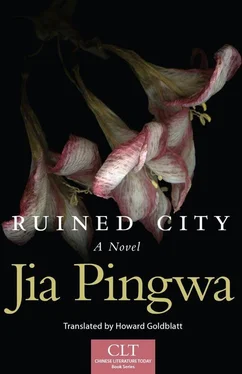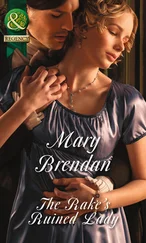“They’re colliers from Shangzhou. They made some money after coming to the city and sent for their families. One of them is pregnant.”
“Those women have all had second or third pregnancies, despite the national family policy,” Zhuang said. “The poorer people are, the more children they have, and that makes them even poorer. I don’t know what they’re thinking.”
“I was at the hospital the other day,” Yueqing said, “and the woman from number 10 was in the outpatient department. She said she wanted a doctor to check the position of her fetus. He wanted to check her abdomen with a stethoscope. When she undressed, he saw that her belly was so filthy, so black, he had to clean it with rubbing alcohol, leaving white streaks with each swipe. ‘You should have cleaned up before you came here,’ he told her. She turned red. ‘My husband’s a collier,’ she said.” Niu Yueqing laughed. So did Zhuang Zhidie. “A reincarnated ghost,” the old lady exclaimed. “The child’s about to come into the world.”
The words were barely out of her mouth when the bawl of a newborn baby pierced the air, followed by the sounds of running and pounding on a door. “Gensheng!” a man yelled, “She’s had the baby! Let’s go to Dongyang Street to buy wheat pancakes and a pot of rice wine. She’s so hungry she could eat a cow.”
Zhuang and his wife exchanged looks, wondering if maybe her mother knew what she was talking about. They looked back into the sky, turning somewhat fearful. Quickly burning what was left of the spirit money, they were rushing inside when a figure burst out from behind a parasol tree at the end of the lane. “Mrs. Niu!” she shouted, “Mrs. Niu!”
“Who is it?” the old lady asked.
“It’s me.” When she came close enough to be seen in the light of the fire, Zhuang recognized her as the Wang woman from the lane to the right. He snorted and went inside.
The Wang woman, a one-time prostitute at Spring Garden, had married a secretary to General Hu Zongnan and borne him a son who died in a motorcycle accident as a young man. A few years later, the former secretary died, leaving her, a childless widow, to live out her days alone, hard, lonely days. She had opened a private nursery in her spacious home two years before. Since she lived nearby, she visited often to gossip. Zhuang did not welcome her visits, for she was evasive, crafty, and sneaky. He complained that she was a bad influence on the children in her care, a comment that upset his mother-in-law and drew accusations of prejudice from Niu Yueqing. To be sure, Wang usually dropped by when Zhuang was not there, seldom when he was. Some six months earlier, she had wondered aloud why Zhuang and Niu Yueqing still did not have a child at their age, a comment that Niu Yueqing’s mother found heartbreaking. She explained that her daughter had been pregnant the year after she was married, but because they were not ready to have a child, she had had an abortion. The second time, they had said that he wanted to wait till he was fully established before having a child, so that pregnancy was also terminated. Now they had everything they wanted, but she could not get pregnant. The Wang woman said she knew of a secret formula that guaranteed not only pregnancy, but the birth of a son. Thrilled by the news, the old lady passed it on to Niu Yueqing, who tearfully admitted that she desperately wanted a child, but that nothing had worked, and that Zhuang’s potency was on the wane. She found it strange that he was virile when he didn’t need to be, and impotent when he did. None of the many doctors they had consulted could help him, leading them to accept the fact that they would grow old childless. Niu Yueqing’s mother fretted over this for days before coming up with a plan: they would go to the northern suburbs to ask the elder daughter of Niu Yueqing’s “dry mother” to carry a child whom they would then raise as their own. A family member was preferable to raising a child by a total stranger. By sheer coincidence, the woman was pregnant when they divulged their plan to her, and she was beside herself with joy. The old lady had one condition: they would only take a boy, and she demanded that the woman submit to an ultrasound exam. It was a girl, so she aborted. Next the old lady took her to see the Wang woman, who told her what to do: she was to have sex three days after her period ended to get pregnant, then begin taking a patent medicine, one small spoonful in the morning, another at night, putting up with the bitter taste and ignoring the slight discharge. The old lady gratefully offered to pay for the bottle of dark, thick liquid, but Wang told her she need not pay anything till a baby boy was born. The medicine’s most valuable ingredient was agar wood, which had to be imported. The woman told them she had some that had already been paid for, and was giving it to Mrs. Niu for her urgent need. They would have to buy enough to make another batch for the donor family. Niu Yueqing searched for agar wood, and Zhuang Zhidie was not happy to hear what she was doing. That led to arguments.
On this day, after watching Zhuang walk inside, Wang smugly announced to Niu Yueqing’s mother, replete with gestures, “Did you hear the baby’s cry in number 10? The collier’s wife had three girls in a row before taking my medicine. Now she’s had a boy. I’ve been at their house for days waiting for her to have her baby. Her husband said he might not let me go if she had a girl, and I said, ‘If she doesn’t have a son, I’ll refund what you paid for the medicine. If it’s a boy, it’ll be the twenty-second birth from taking my medicine.’ And there you have it, she had a son!”
“I believe you,” Yueqing said, elated by the news. “I bought some agar wood.”
“Did you?” Wang exclaimed. “Then don’t forget me when you have your son.”
Yueqing invited Wang inside for tea. “Another day,” Wang said.
Her fear forgotten, Yueqing walked home down the dark lane to get her agar wood.
“Was that Wang woman talking to you about having a baby again?” Zhuang asked.
“Her medicine works,” Yueqing said. “The collier’s wife took it, and she had a son.”
Zhuang asked how much the agar wood had cost her. Five hundred yuan, she told him, sending him infuriated into the kitchen for a bowl of porridge. As soon as he was finished, he climbed into bed under the mosquito net.
Niu Yueqing and her mother were in a good mood when they returned for dinner. They took a basin of hot water into the bedroom to wash up, and they told Zhuang that Hu Zongnan’s one-time secretary had given the secret formula to his wife. Just before he died, worried about her spending the rest of her life alone, he divulged the formula to her as a means of survival. Zhuang said nothing. After washing up, Yueqing sprayed on a bit of perfume, got some hot water, and told Zhuang to get out of bed and wash up. He said he wasn’t interested, so she lifted up the netting, took off his clothes, and said, “Maybe you aren’t, but I am. The Wang woman gave me some of her medicine, so let’s give it a try. I don’t want to raise someone else’s child if I can have one of my own. If this doesn’t work, she can let us raise hers as our own without making it public. That way we’ll have a future generation, someone you can nurture as a writer, and when he grows up, as the biological son of a relative, he won’t turn his back on us.”
“I’ve never liked that so-called sister of yours or her husband,” Zhuang said. “Every time they’re here, they complain about how they’re living in poverty and ask us to help out. And the way she gets herself pregnant and then terminates the pregnancies tells me that they have their eye on our property.”
She worked to get him aroused by washing his privates before they climbed under the mosquito net and turned off the light. He knew he lacked the needed potency, so he let his hands roam over her body. ☐☐ ☐☐ ☐☐ [The author has deleted 111 words.]
Читать дальше


![Matthew Vincent - [you] Ruined It for Everyone!](/books/216429/matthew-vincent-you-ruined-it-for-everyone-thumb.webp)









